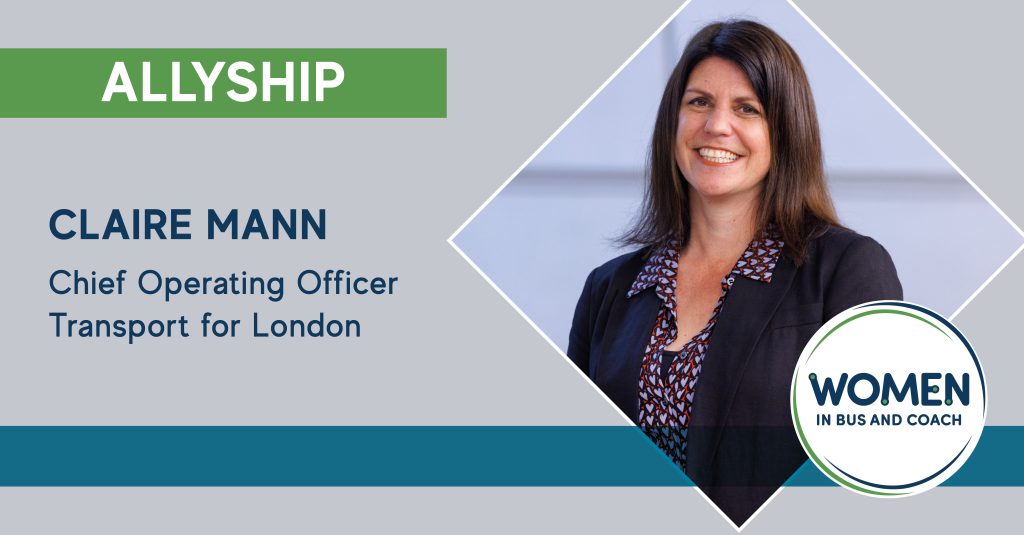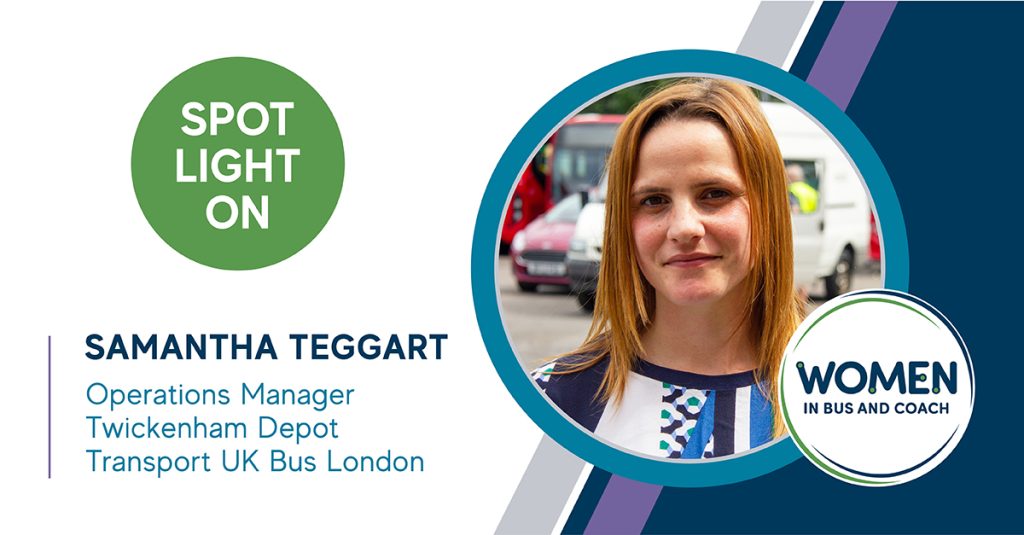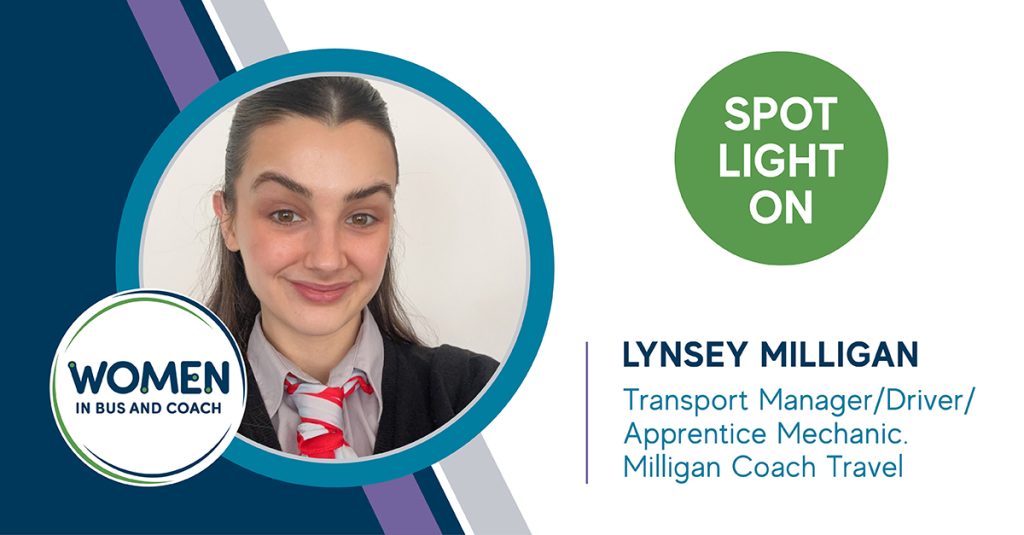Our Allyship initiative recognises individuals who have been allies in supporting and encouraging Women across the bus, coach, and community transport sector. Individuals who have contributed significantly to the professional growth and empowerment of women, whether through mentorship, advocacy, or creating opportunities for women to thrive, these allies have played a crucial role in promoting gender equality and diversity in our sector.
This initiative aims to encourage everyone to be allies, with the individuals featured sharing insights into their own professional career background, their ally approach, as well as providing suggestions and advice on how we all can be allies.
Today we hear from and learn about:
Claire Mann
Chief Operating Officer
Transport for London
How did you get to where you are today?
I started in the transport industry by joining Heathrow Express when it was a new company. I went from growing up in a small village in Dorset with no train station to becoming the first female driver of the Heathrow Express!
A colleague at the time convinced me to learn to drive a train after we both passed the train driver assessment. That unlocked everything for me, I moved into management and then into leadership roles.
My career has been driven by a passion for leading people and delivering excellent service. For over 27 years now, I’ve worked in transport roles. I’ve moved from one role to another by staying true to my values, leading with integrity, and enjoying my work. Now, as Chief Operating Officer, I feel proud of my journey and the impact I’ve made.
Did you experience any challenges getting to where you are today?
I’ve faced challenges as a woman in a male-dominated industry. I have often been underestimated, I have had experiences of male colleagues being surprised at my job role or explaining things that are part of my job to me in a very basic way. However, I’ve remained resilient, using these experiences to strengthen my resolve.
If I do still encounter people with outdated attitudes, I aim to respectfully challenge them. My journey has taught me the importance of leading with integrity and supporting others, especially women, in their career growth, which is part of what being an ally is, challenging unacceptable behaviour and supporting others.
What drives me is seeing people develop and succeed in their careers. People who feel valued and happy at work will deliver their best which ultimately leads to a better service for our customers.
What do you like about the sector?
I love working at Transport for London because we provide vital, accessible, and affordable services that enrich people’s lives. Whether it’s physical accessibility, affordability, or connectivity like Dial-a-Ride and our Bus network, we make a positive impact. The care we put into every detail, even how we handle customers’ lost property, reflects our commitment to doing the right thing for everyone in London.
Seeing how our services enable people to live their lives makes me proud. Every day is different, and it’s brilliant to be part of a team that connects communities and leads with integrity.
What does a typical day look like?
My typical day is very varied. I oversee 10 Directors, who each manage different parts of the network with unique challenges. My day includes many meetings covering a wide variety of topics, I could be discussing issues like fleet challenges on the Underground and then discussing the future electrification of the bus network, and then carry out site visits to stations and depots.
The parts I love most are being out on the network, engaging with our brilliant people in their working environment, and chatting with frontline staff. While sometimes the enormity and responsibility of the role can be overwhelming, it’s also incredibly rewarding.
Why does the sector need allies and how do you bring this into your role?’
The transport sector, and especially the bus industry, needs allies to support change in this sector. Things are changing, but in many areas of the sector it is still a male dominated environment and I want to encourage more diversity in the industry.
Bus drivers face complex conditions that make their roles demanding. However, I believe that the bus sector is the most accessible part of transport and is crucial for community connectivity.
During Covid-19, the vulnerability of bus drivers became evident, highlighting the need for better support and recognition. Diversity and modernisation are essential for progress. The bus industry is flexible, innovative, and iconic, especially in London. Allies can help drive positive change and ensure the sector thrives.
I bring this into my role by advocating for diversity, supporting staff, and promoting the value of the bus industry.
Why is diversity important?
Diversity is crucial because it brings different perspectives and ideas, making discussions richer and more effective. It also creates a safe and inclusive environment where everyone feels represented and valued. As Chief Operating Officer, I encourage openness and honesty, allowing people to express themselves and feel comfortable. Inclusion is key to attracting diverse talent, and sharing real stories helps show that our industry is accessible and welcoming.
What changes have you made in your role to support women and to encourage more women into the bus and coach sector?
In every role I’ve held, I’ve ensured there is a strong people focus in the business. In my current role we regularly discuss talent, wellbeing, development, mentoring, and apprenticeships in our meetings. Diversity and inclusion are business necessities, not just nice-to-have elements.
I also provide feedback and career advice to those who apply for jobs, encouraging them to pursue opportunities. Additionally, I’ve engaged in reverse mentoring to understand and support diverse experiences, helping to change policies and promote inclusivity.
What could the sector do collectively together to change for the better?
The sector needs to adopt fresh approaches to training, development, and addressing challenges. We should learn from different regions and ensure initiatives have lasting impact. Engaging communities and addressing practical needs, like facilities for bus drivers, is crucial.
We need a more open culture where safety concerns and mistakes are discussed for learning, not punishment. Modernising our approach to performance and well-being, similar to the rail industry, will help us progress collectively.
Thank you for sharing your story Claire and thank you for being an ally and your support of the Women in Bus and Coach Initiative.
To find out more about who Claire works for and career opportunities visit: https://tfl.gov.uk/corporate/careers/


